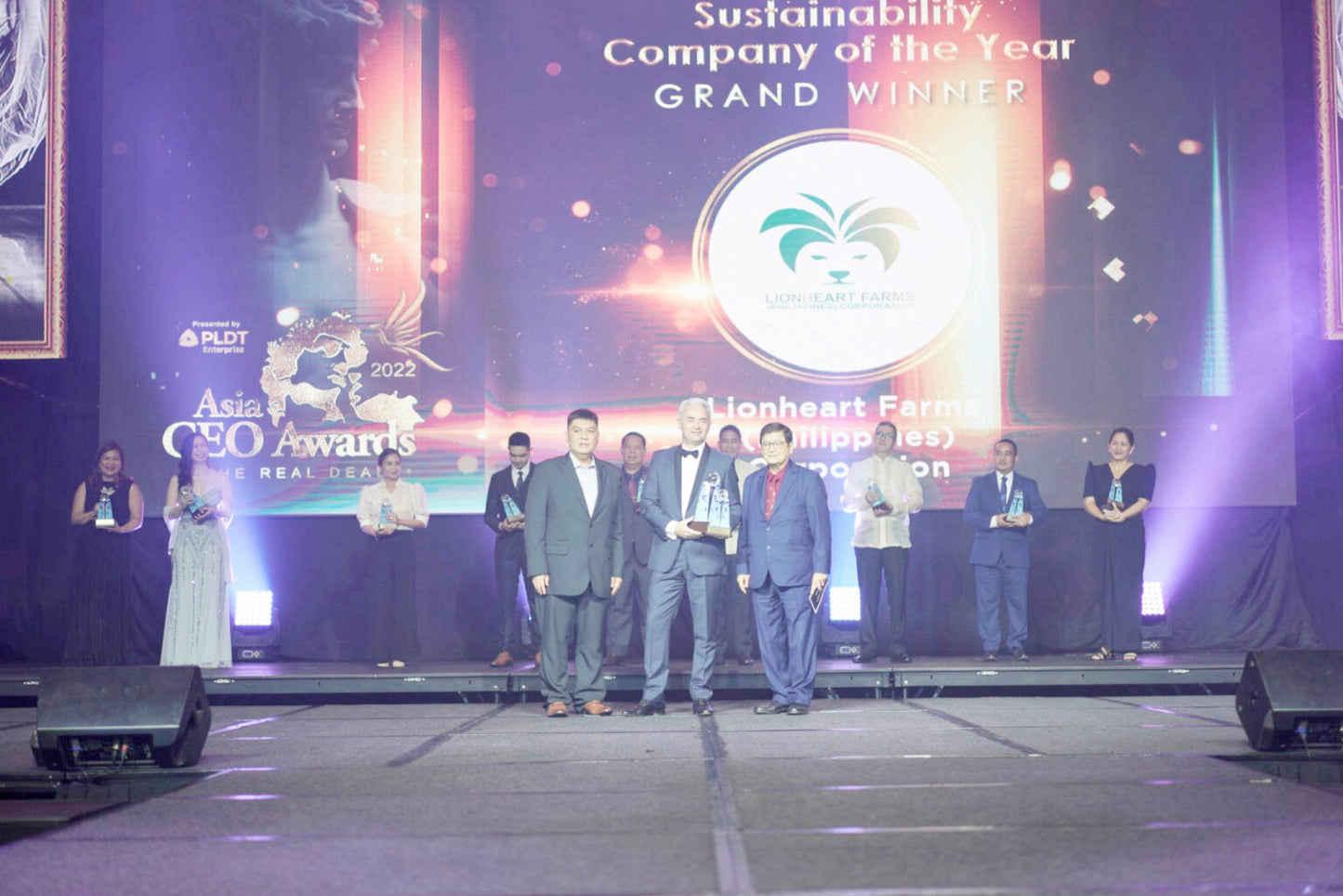
Lionheart Farms won the Sustainability Company of the Year award at the recent Asia CEO Awards 2022, the largest celebration of leadership excellence in Southeast Asia.
The South Palawan-based company was among 10 shortlisted commercial industries in the Circle of Excellence awards — an impressive group of nominees making tremendous contributions to the nation’s development.
Lionheart won as Sustainability Company of the Year among more than 400 nominations received from the nation’s most important organizations and leaders. It topped the judging criteria in Management Achievement, Financial Contribution, Pioneering Achievements, Recognition and Social Commitment.
The award was given at a grand event on 11 October at the Manila Marriott Grand Ballroom.

Lionheart’s award was received by Christian Eyde Moeller, Lionheart co-founder and CEO. In his remarks, he said: “Sustainability guides us toward a holistic approach for the benefit of people and the planet. There is both a need and an opportunity in the transformation of agriculture and the sustainable development of rural Philippines. In our sustainable approach, we are first and foremost looking to ensure the equitable participation of everyone. Having a value-based approach forces us to rethink traditional approaches, as obviously just continuing to do the same will not bring true sustainable transformation.”
“Leaving rural communities and independent farmers to navigate the complexities of the needed transformation alone will not deliver the desired outcome,” he added. “Each of the four pillars of sustainability bring their own unique challenges, demanding dedicated and specialized resources to address them.”
Lionheart Farms, which started its operations in 2016, is an integrated coconut farming and processing company in Rizal, Palawan that produces coconut sap to manufacture organic products such as coconut syrup, sugar, vinegar, teriyaki, and aminos. Creating work for almost two thousand people, it has become one of the largest employers in Palawan, committed to regenerative farming with a large network of local suppliers that provide natural ingredients for organic fertilizers.
In addition to its own 3,500-hectare farm, Lionheart also operates rented palms in partnership with independent farmers across the three municipalities of Quezon, Rizal, and Bataraza to harvest sap.
Lionheart has pioneered certified organic regenerative farming, reformulating natural farming practices and implementing a comprehensive bio-yield and bio-defense system by producing all of its own bio-organic inputs from local ingredients supplied from within the local community. The company is committed to zero waste, producing biochar and thermal power from waste biomass and promoting a circular economy that brings value to what has been seen as waste.
For its efforts, Lionheart has become the first agricultural company in Asia to be certified under the international Climate Bonds Initiative supported by the US Agency for International Development and GreenInvest. It is well advanced in the process of issuing its first Voluntary Carbon Credits, with an annual carbon sequestration estimated at 300,000mt CO2e.
It has also been recognized by USAID as a future model for sustainable development and the transformation of tropical agriculture. Its methods have been measured and validated by the United Nations’ Food and Agriculture Organization using the Sustainable Assessment of Food and Agriculture Systems, with an outstanding sustainability performance record and the best ratings in all SAFA themes.
The company is committed to becoming one of the most sustainable companies in the Philippines by having net-zero emissions and integrating sustainability in all its strategic goals and initiatives today and in the future. Few companies involved in agriculture have reached the level of compliance and international standards of certification that have been reached by Lionheart, excelling in all aspects of sustainability: Good governance, environmental integrity, economic resilience, and social well-being.
This was originally published at The Daily Tribune on October 23, 2022.
